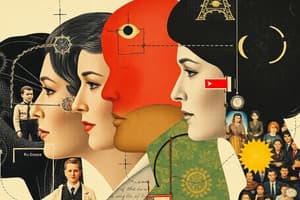Podcast
Questions and Answers
Which management theory emphasizes the careful selection and training of workers and supervisory support?
Which management theory emphasizes the careful selection and training of workers and supervisory support?
- Administrative Management
- Behavioral Management
- Bureaucratic Management
- Scientific Management (correct)
According to the Bureaucratic Management theory, what is the foundation of a rational and efficient organization?
According to the Bureaucratic Management theory, what is the foundation of a rational and efficient organization?
- Personal relationships between managers and employees
- Informal rules and procedures
- Flexibility and adaptability to change
- Logic, order, and legitimate authority (correct)
Which leadership style is characterized by a manager who prioritizes task completion over the well-being of their employees?
Which leadership style is characterized by a manager who prioritizes task completion over the well-being of their employees?
- Participative Style
- Laissez-Faire Style
- Democratic Style
- Autocratic Style (correct)
In Mary Parker Follett's leadership theory, what is considered genuine power?
In Mary Parker Follett's leadership theory, what is considered genuine power?
What is a key characteristic of the Laissez-Faire leadership style?
What is a key characteristic of the Laissez-Faire leadership style?
Which of the following is NOT a principle of Bureaucratic Management?
Which of the following is NOT a principle of Bureaucratic Management?
Which of the following skills is typically associated with a frontline manager?
Which of the following skills is typically associated with a frontline manager?
What is the primary focus of the Controlling function of management?
What is the primary focus of the Controlling function of management?
Which personality trait is characterized by kindness and a great interest in others?
Which personality trait is characterized by kindness and a great interest in others?
What term describes someone who possesses traits of both introversion and extroversion?
What term describes someone who possesses traits of both introversion and extroversion?
Which level of management is responsible for guiding overall organizational performance?
Which level of management is responsible for guiding overall organizational performance?
What does intellectual capital refer to in a workplace?
What does intellectual capital refer to in a workplace?
Which of the following is NOT a Big Five personality trait?
Which of the following is NOT a Big Five personality trait?
What is the term for the invisible barrier preventing women and minorities from advancing in organizations?
What is the term for the invisible barrier preventing women and minorities from advancing in organizations?
Which personality trait involves planning ahead and being thoughtful?
Which personality trait involves planning ahead and being thoughtful?
What is the main effect of workplace diversity?
What is the main effect of workplace diversity?
Flashcards
Introvert
Introvert
A personality type characterized by a preference for solitude and quiet, often avoiding social interactions.
Extrovert
Extrovert
A personality type characterized by a love for social interaction and excitement, often seeking out stimulating environments.
Ambivert
Ambivert
A personality type that blends qualities of both introverts and extroverts, enjoying both social interaction and solitude.
Intellectual capital
Intellectual capital
Signup and view all the flashcards
Motivation
Motivation
Signup and view all the flashcards
Glass Ceiling
Glass Ceiling
Signup and view all the flashcards
Globalization
Globalization
Signup and view all the flashcards
Managers
Managers
Signup and view all the flashcards
Leading
Leading
Signup and view all the flashcards
Planning
Planning
Signup and view all the flashcards
Organizing
Organizing
Signup and view all the flashcards
Controlling
Controlling
Signup and view all the flashcards
Technical Skills
Technical Skills
Signup and view all the flashcards
Human Relations Skills
Human Relations Skills
Signup and view all the flashcards
Conceptual Skills
Conceptual Skills
Signup and view all the flashcards
Scientific Management (Taylor)
Scientific Management (Taylor)
Signup and view all the flashcards
Study Notes
Personality Types
- Introvert: Prefers solitary activities and less social interaction.
- Extrovert: Enjoys social interaction and being around others.
- Ambivert: A blend of introversion and extroversion, enjoying both solitude and social activities.
Personality Myths
- Extroverts aren't always talkative.
- Introverts aren't always boring or antisocial.
Big Five Personality Traits
- Extraversion: A social personality trait.
- Agreeableness: Kindness, concern for others, and interest in leadership.
- Openness: Creativity and receptivity to new experiences.
- Conscientiousness: Planning, thoughtfulness, and organization.
- Neuroticism: Experiences and expression of emotions. Characterized by worry and moodiness.
Motivation
- The reason(s) behind a person's actions or behaviors.
Intellectual Capital
- The combined knowledge and skills of a workforce. This collective intelligence is valuable for generating output.
Workplace Diversity Benefits
- Diverse perspectives lead to a wider range of ideas and opinions. This avoids stagnation.
Glass Ceiling
- An unseen barrier preventing women and other groups from advancing to higher levels of responsibility.
Globalization
- The worldwide interconnectedness of resource markets, products, and competition.
Levels of Management
- Top-Level Managers (e.g., CEO): Guide overall organizational performance.
- Middle-Level Managers (e.g., Department Managers): Oversee specific areas (marketing, finance, etc.).
- Front-Line Managers (e.g., Store Managers): Direct the work of employees at the operational level.
Management Functions
- Planning: Setting objectives and directions for the organization.
- Organizing: Coordinating people and resources to execute plans.
- Leading: Motivating employees to achieve organizational goals.
- Controlling: Monitoring progress and making corrections to stay on track.
Management Skills
- Technical Skills: Needed for hands-on tasks (often associated with front-line managers).
- Human Relations Skills: Important for interacting with others (critical for middle managers).
- Conceptual Skills: Used for decision-making and strategic planning (common for top-level managers).
Classical Management Theories
- Scientific Management (Taylor): Focuses on worker selection, training, and supervision support.
- Administrative Management (Fayol): Established 14 principles of management, emphasizing organizational structure.
- Bureaucratic Management (Weber): Features a structured organization based on logic, authority, and rules. (Key principles: clear division of labor, hierarchy, rules, impersonality, merit-based careers)
Behavioral Management Theories
- Conflict Resolution: Addressing underlying needs and achieving "win-win" outcomes.
- Mary Parker Follett: Emphasized coactive leadership rather than coercive power, aiming to create group power.
- Leadership: True leaders build group power, rather than personal power.
Leadership Styles
- Autocratic: Focuses primarily on task completion; retains authority; unilateral decision-making.
- Laissez-faire: Shows little concern for task or people; allows for independent decision-making.
- Democratic: Balances task completion and employee involvement in decision-making; collaborative.
Studying That Suits You
Use AI to generate personalized quizzes and flashcards to suit your learning preferences.




